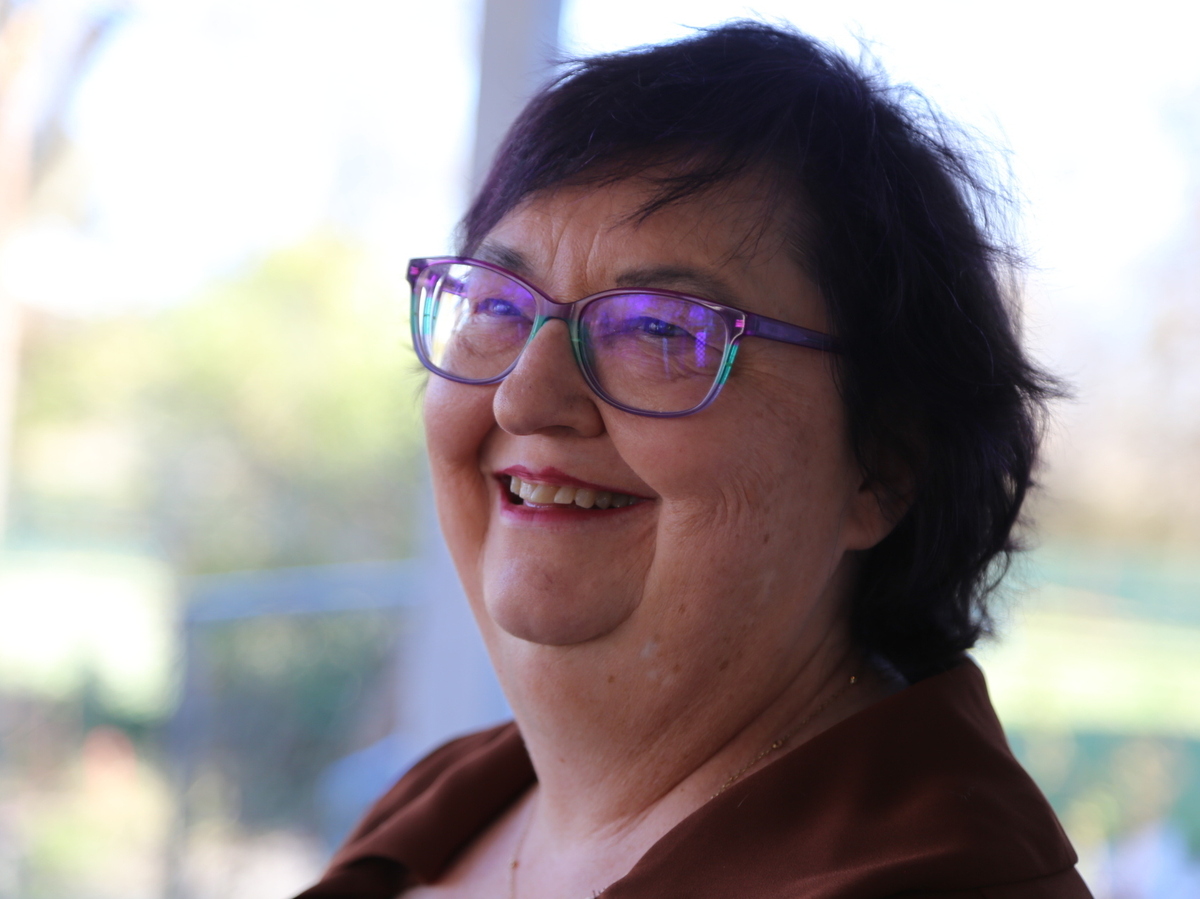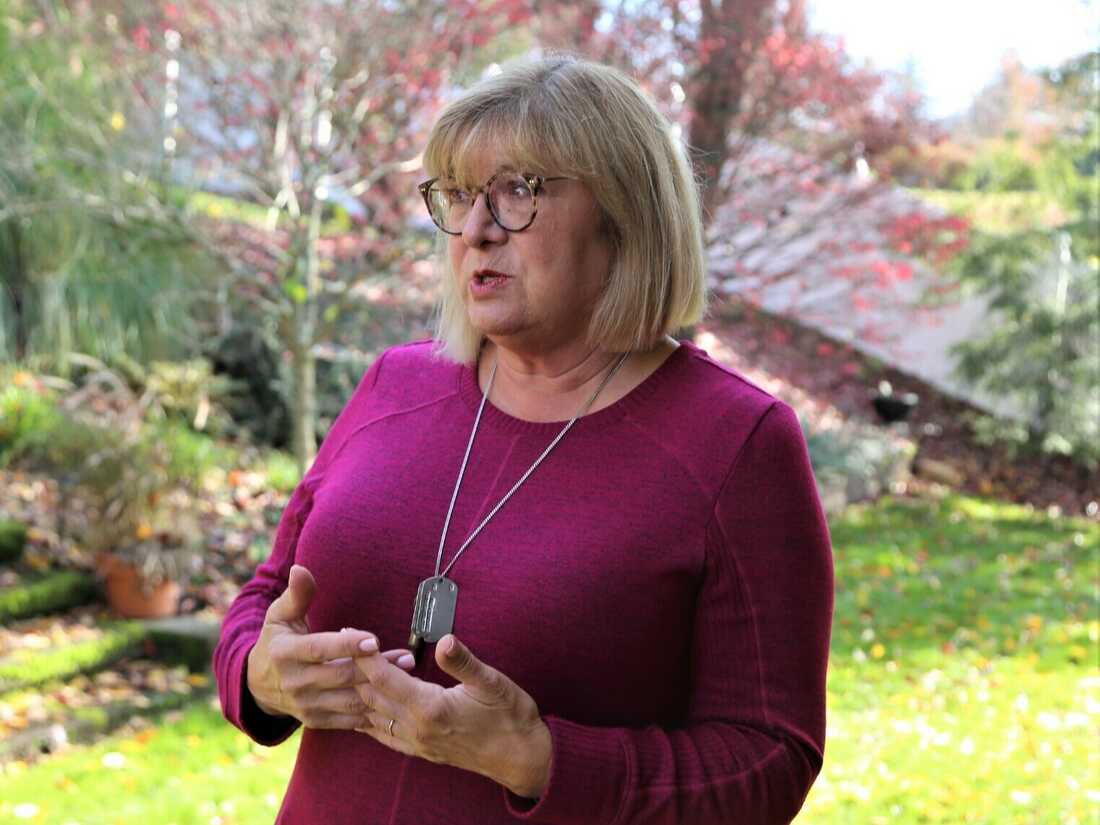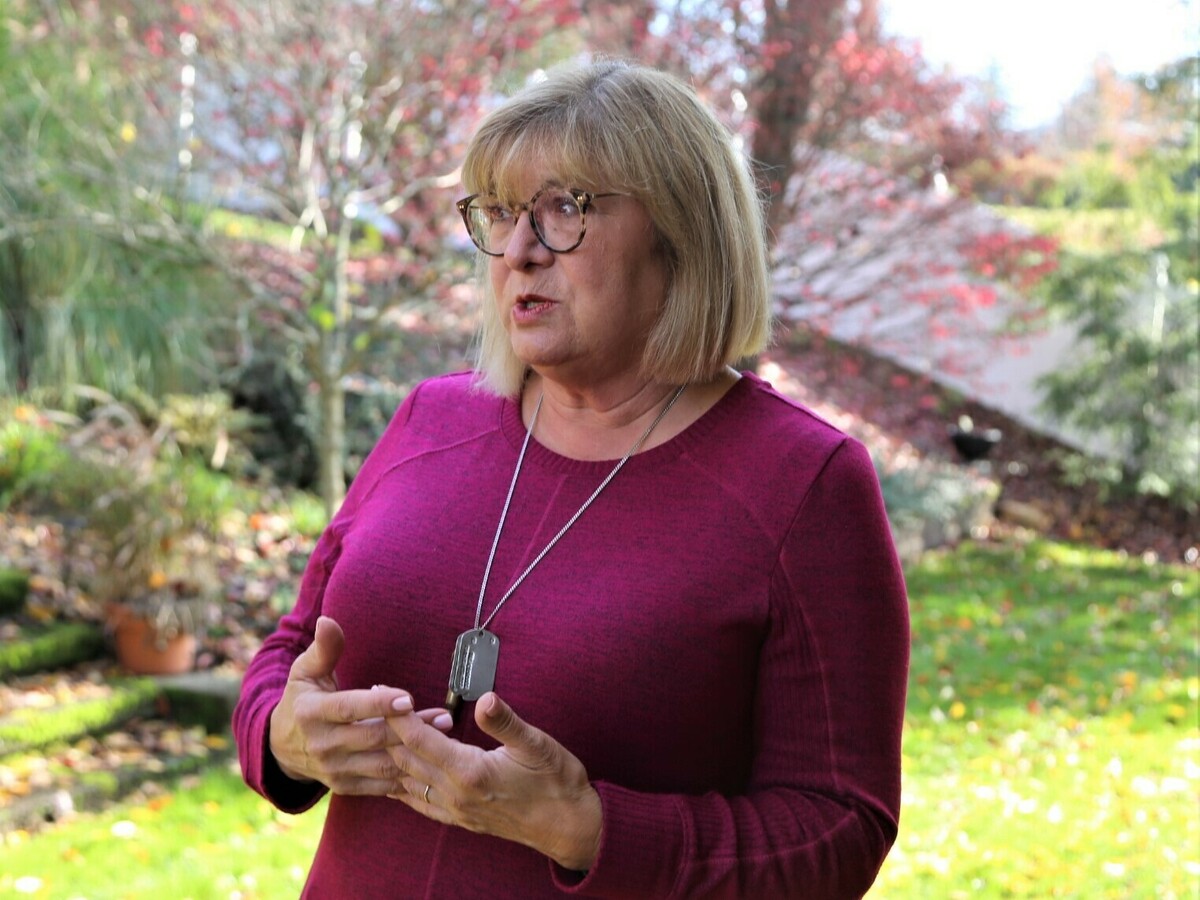
[ad_1]

Sharon Gwinn holds an image of her husband, who had Lewy frame dementia towards the tip of his lifestyles. Reckless monetary conduct was once one of the most first indicators of the illness. “It is what attacked his mind first,” Gwinn says.
Katie Blackley/WESA
cover caption
toggle caption
Katie Blackley/WESA

Sharon Gwinn holds an image of her husband, who had Lewy frame dementia towards the tip of his lifestyles. Reckless monetary conduct was once one of the most first indicators of the illness. “It is what attacked his mind first,” Gwinn says.
Katie Blackley/WESA
Sharon Gwinn have been married nearly 30 years when she cleared out the financial savings and checking accounts that she shared together with her husband, after which transferred that cash into accounts that had been simplest in her identify. It felt terrible, like she was once stealing. However wanting shedding the whole thing, Gwinn was once out of choices.
That was once some twenty years in the past. Gwinn’s husband was once nonetheless running as a health center orderly when he began to spend cash inconsistently. One Thursday evening he racked up a $3,000 tab at a Pittsburgh cop bar, purchasing rounds for strangers. Gwinn says she found out his splurge — one thing completely out of personality for him — when her bank card was once declined on the grocery retailer.
That is when she learned that her husband was once appearing the primary of a chain of cognitive adjustments that finally could be identified as Lewy frame dementia.
“He drove for years after his monetary consciousness was once long gone,” Gwinn says. “It is simply this one house. It is what attacked his mind first.”
A rising frame of analysis presentations that folks with dementia face worse monetary results. As NPR has reported, a 2020 learn about from Johns Hopkins College of 81,000 Medicare beneficiaries discovered that folks with Alzheimer’s and similar dementias began to expand subprime credit score as much as six years ahead of a proper prognosis.
It’s amongst a cluster of research that level to monetary issues as a imaginable serious warning call — slightly than simply the fallout — of cognitive decline.
Carole Shepard, a self-employed geriatric care supervisor in suburban Pittsburgh, says it is best to begin making plans for the monetary implications of dementia when individuals are nonetheless cognitively wholesome: “It is about controlling your personal future.”
Despite the fact that there are not any absolute best answers, there are some steps you’ll be able to take to offer protection to your self or your family members as you age. Here’s recommendation from monetary advisers and psychological well being pros.
Put monetary guardrails in position prematurely
To steer clear of surprises, some monetary advisers suggest having open conversations about cash with family members and putting in place gear that monitor your funds and flag any ordinary patterns.
Sharon Gwinn was once in a position to offer protection to herself and her husband from monetary smash. However now, at 63 and a widow, Gwinn worries that if she, too, develops dementia, she may bankrupt herself ahead of any person notices: “I’d danger a wager, my kids know far more about my funds than almost certainly 90% of the folks in my age staff. They nonetheless have no idea what my daily is.”
Professionals say Gwinn’s worry is an actual risk for tens of millions of American citizens, partly since the monetary business has been hesitant to enact adjustments that might give protection to the wealth of growing old American citizens. That leaves folks and households to hunt out safeguards.
The tech international provides some choices to folks and households who’re looking for improve. In 2020 the Nationwide Institute on Growing old highlighted the paintings of SilverBills, a concierge carrier that makes certain expenses are paid on time and inspects invoices for fraud and mistakes. The Cetera Monetary Workforce has partnered with Carefull, a web based corporate that screens for fraud and monetary mistakes, whilst additionally offering id robbery insurance coverage.
And because the AARP notes, EverSafe scans accounts for ordinary spending, akin to the large bar tab that Sharon Gwinn’s husband tallied.

Sharon Gwinn does not need dementia to hurt her funds if she must come down with it. She designated her oldest daughter as her energy of legal professional and arrange a device to flag any ordinary monetary conduct. This added coverage makes Gwinn really feel lighter.”[My daughter] can expectantly lend a hand me nip issues within the bud ahead of I am getting myself into hassle,” Gwinn says.
Katie Blackley/WESA
cover caption
toggle caption
Katie Blackley/WESA

Sharon Gwinn does not need dementia to hurt her funds if she must come down with it. She designated her oldest daughter as her energy of legal professional and arrange a device to flag any ordinary monetary conduct. This added coverage makes Gwinn really feel lighter.”[My daughter] can expectantly lend a hand me nip issues within the bud ahead of I am getting myself into hassle,” Gwinn says.
Katie Blackley/WESA
EverSafe says it could actually additionally lend a hand save you monetary fraud and exploitation — a significant scourge for older American citizens. The Nationwide Council on Growing old estimates that seniors within the U.S. lose $36.5 billion annually because of elder monetary abuse. (When put next, ultimate 12 months American citizens spent $45 billion in out-of-pocket prices on nursing house and different institutional care.)
“The ones in reality sensible scammers don’t seem to be simply going to thieve an enormous quantity from one account,” says Liz Loewy, EverSafe’s leader working officer, in addition to the previous leader of the elder abuse unit on the New York County District Lawyer’s Workplace. “They typically are sensible sufficient to begin small and canopy multiple account at multiple establishment.”
No longer everybody can have enough money a carrier like EverSafe: applications vary from more or less $7 to $26 a month. However one of these carrier would possibly have helped Gwinn, who could not save you her husband from signing up for brand new bank cards even after she took keep an eye on of the couple’s funds. After consulting her 4 kids, she determined to buy the fundamental bundle for herself.
Now Gwinn’s oldest daughter, who’s designated as her energy of legal professional, shall be notified if EverSafe flags anything else ordinary. This added coverage makes Gwinn really feel lighter.
“[My daughter] can expectantly lend a hand me nip issues within the bud ahead of I am getting myself into hassle,” Gwinn says.
Paintings in combination to arrange a collaborative plan along with your circle of relatives
Much more than monetary tracking, arguably a very powerful factor you’ll be able to do is to contain your circle of relatives or buddies in a collaborative plan round growing old and funds — preferably ahead of any signs of dementia seem.

Carole Shepard, a geriatric care supervisor, and her husband each have circle of relatives histories of dementia. They have got drafted in depth monetary plans and shared them with their grownup kids. “Hope isn’t a technique,” she says.
Katie Blackley/WESA
cover caption
toggle caption
Katie Blackley/WESA

Carole Shepard, a geriatric care supervisor, and her husband each have circle of relatives histories of dementia. They have got drafted in depth monetary plans and shared them with their grownup kids. “Hope isn’t a technique,” she says.
Katie Blackley/WESA
That is more uncomplicated mentioned than carried out, says Matt Lundquist, a New York Town-based therapist who ceaselessly works with households on problems round cash — akin to budgeting or taking good care of an aged mother or father.
Cash can constitute balance, keep an eye on, energy, autonomy and protection, Lundquist notes. Subsequently, addressing the monetary protection issues calls for other folks to recognize the inevitability of dying — their very own and that of the ones they love — in addition to the bodily, psychological and financial realities of growing old. Even in the most productive of instances, cash is a sensitive matter — one that may carry discomfort and hackles, and one this is ceaselessly regarded as nobody else’s trade
It is a very powerful to not blindside members of the family with this giant communicate; as an alternative, Lundquist advises that folks give a heads-up that cash problems want to be mentioned: “It makes a hard dialog a lot more prone to cross smartly.”
The dialog must duvet subjects akin to deciding on a monetary energy of legal professional, easy methods to safeguard in opposition to exploitation, and the duties of daily cash control. A information from the College of Minnesota provides a number of sensible recommendation on the whole thing from deciding on a monetary recommend to a listing of necessary paperwork and easy methods to entire a monetary stock.
Carole Shepard, the Pittsburgh-based geriatric care supervisor, warns that arduous conversations are important and conflicts are inevitable, particularly after they contain somebody with revolutionary dementia. Too ceaselessly, she sees her older shoppers in disaster as a result of their hope have been that sooner or later they might peacefully die of their sleep with none of the humiliations of growing old.
“Hope isn’t a technique,” she says.
That is why Shepard and her husband, each of their 60s and each with circle of relatives histories of vascular dementia, have drafted in depth plans which they have got shared with their grownup kids. They appointed their more youthful son as monetary energy of legal professional and their older son as clinical energy of legal professional. Through making those selections now, Shepard and her husband consider — hope — they are protecting their autonomy.
Shepard additionally hopes that being proactive will make it more uncomplicated on her circle of relatives, each emotionally and financially, as she and her husband proceed to age.
Sharon Gwinn feels the similar approach: “I don’t want my kids to be liable for taking good care of me. What I’ve, I would like my cash to be spent for my care, and I do not wish to burden them.”
If dementia has already set in, come with family members in decision-making up to imaginable
Each Gwinn and Shepard know that in the event that they do ultimately expand dementia, all their making plans may not give protection to their kids from some extent of hardship. Signs are unpredictable and variable: melancholy, irritability, paranoia, impulsiveness. That creates a predicament for grownup kids: Pushing lend a hand onto resistant folks incites strife; ignoring truth begets overlook.
“In actual fact it will be tough, and the probabilities of entire good fortune don’t seem to be excellent,” says Bob Levenson, a professor on the College of California, Berkeley who makes a speciality of the emotional adjustments that accompany growing old.
Levenson’s highest recommendation for caregivers and family members is to incorporate the individual with dementia within the decision-making procedure up to imaginable. If an individual can not articulate their wants, it is nonetheless necessary to believe the values and pursuits they held whilst wholesome.
For instance, in all probability a lifelong soccer fan is now not in a position to paying their very own expenses; the individual in control of their per thirty days finances may come with a cable bundle that lets them watch NFL video games.
It is a very powerful to understand that the illness is the enemy, Levenson says: “Someway, you will have to check out to give you the option to stick at the similar facet with your beloved and now not finally end up blaming every different.”
Sarah Boden’s reporting on dementia and monetary decision-making is a part of a fellowship with the Affiliation of Well being Care Reporters, supported by way of The Commonwealth Fund.
[ad_2]

